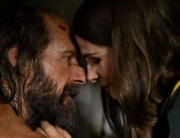
Director Denis Villeneuve accomplishes what David Lynch failed to do. He turns Frank Herbert’s multilayered, 1965 sci-fi classic novel into an involving adventure, a saga with cross-cutting action scenes, mini-cliffhangers, and stunning cinematography with contrasting color palettes. In other words, he gives you the works. It has to be noted, though, that the plot begins percolating approximately at the 70-minute mark.
Lynch’s 1984 attempt stumbled in its first reel, shoving a chock-full of exposition down the viewers’ throats and spoon-feeding information throughout, and the worldbuilding never became quite clear. The new screenplay, adapted by Jon Spaihts, Eric Roth, and Villeneuve, layers in the intrigue of the intergalactic battle for the galaxy’s most valuable resource, the spice found on the desolate planet Arrakis, in the year 10191.
For 80 years, the imperialistic House Harkonnen has monopolized spice production and has become wealthy. The substance, necessary for interstellar space travel, is also a sacred hallucinogen to the Fremen, a civilization living underground and at war with the Arrakis’s occupiers. They believe one day a “great man” will lead them to freedom.
This time around, Villeneuve has produced a clearer vision. He and his team know when to say when, not attempting to cram all of Herbert’s convoluted narrative into one film. Instead, he roughly covers in 155 minutes about two-thirds of the terrain that Lynch’s 137-minute adaptation took on.
Both movies make many of the same cuts from Herbert’s dense text, and much of the imagery looks strikingly similar, from the granite fortress of the House Atreides to Arrakis’s humongous slithering carnivorous sandworms and the stillsuits worn in its desert landscape that sustain the wearer’s life. That isn’t surprising, considering both productions were inspired by the same material. Villeneuve’s production design has more touches of Hollywood’s version of the Middle East: the Bedouin–like clothing of the Fremen and the deliberate hints from Hans Zimmer’s musical score. (Exteriors were filmed in Jordan and the United Arab Emirates.)
Mercifully, the new film has toned down the grotesquery of the duplicitous Baron Vladimir Harkonnen (Stellan Skarsgård). As though to atone for the toxic and homophobic 1984 characterization (played by Kenneth McMillan), the Baron’s homosexuality is barely hinted at, and no skinny blond youths were harmed in his rampages nor is there puss oozing out of open sores.
In another alteration, Villeneuve ramps up the screen time of Lady Jessica (Rebecca Ferguson), the mother of Paul (Timothée Chalamet), the son of Duke Leto Atreides (Oscar Isaac), ruler of the oceanic planet Caladan (Norway substitutes). The second half becomes a mother and son survival tale after the family loses political power. Lady Jessica’s like a British nanny: loving but firm, in control of her emotions. Her counterpart in 1984 practically vanishes midway, though that might have had more to do with actress Francesca Annis’s injury from a gas oven explosion. And although Chalamet may look more like an emo rocker than a fighter, his slender boyishness is appropriate for a student prince. Becoming a hero doesn’t happen overnight.
Nearly all the actors underplay their roles, as Villeneuve has directed them to internalize their performances. The excitement builds mainly from the pacing and the battle scenes. By the time the movie ends, you feel the momentum’s just warming up, that it has built a sturdy foundation for the next installment. In fact, the last close-up hints at ambivalence, that the liberation of Arrakis from the occupying Harkonnen forces will not be clear cut. However, the movie doesn’t quite know when to end: Paul’s final confrontation testing his mettle drags out, and his futuristic visions (a gift he inherited from his mother) flash on and off the screen, often putting the story’s momentum briefly on pause.
Dune has a rhythm apart from the Marvel Comics Universe, or practically any big-budget actioner. It takes its time laying out what is at stake. Truth be told, had I watched this on HBO Max, which will stream it the same day as its theatrical release, I may not have stuck around past the first 30 minutes. That’s the only time where it almost becomes ponderous, especially all the talk about planetary alliances.
For admirers of the book, they will see much of Herbert’s universe on screen, and they’re sure to get their money’s worth just from the visuals alone. It was undoubtedly made as a big-screen spectacle, where it should be seen at its own pace-setting advantage.
Dune open theatrically in the United States and begins streaming on HBO Max on October 22.






Leave A Comment